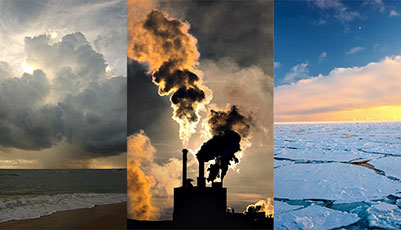
New York, NY, June 20, 2017 – Researchers from the Center on Terrorism at John Jay College of Criminal Justice reported new data concerning how the American public views the relationship between climate change and security. Working with GfK Custom Research, LLC (GfK), the study’s authors, Professor Charles B. Strozier and Research Fellow Kelly A. Berkell, designed questions to begin quantifying public familiarity with the idea of climate change as a security threat, along with the potential impact that increased or changed awareness might exert on individual lifestyle and voting decisions.
Findings of the Public Perceptions of Climate Change and Security report suggest that the public – even those who believe that climate change is happening and that human actions are causing or contributing to it – remains largely unfamiliar with the idea of a connection between climate change and security. About 38 percent of all respondents, and 42 percent of those who think human-caused climate change is occurring, expressed familiarity with the general idea that climate change may multiply global threats such as political violence or mass migrations, or act as a catalyst for conflict. Even fewer, only about 14 percent of all respondents, had ever heard or read that a severe drought in Syria, likely caused or worsened by climate change, was one of many factors that helped spark the initial conflict that continues there today.
Nevertheless, respondents indicated openness to changes in behavior if they came to believe that climate change and security were causally interrelated. Participants reported the greatest willingness to take action if U.S. national security, rather than global security, were at stake. Taking an inclusive approach to “openness,” encompassing “definitely,” “probably,” and “maybe” responses, researchers found that 90 percent of those who think human-climate change is happening were open to modifying their voting priorities, and 93 percent were open to seriously considering lifestyle changes, if they perceived a threat to national security. When excluding “maybe” responses, willingness to “probably” or “definitely” adapt behavior along the same lines measured at 66 percent and 67 percent among those who think that human-caused climate change is occurring.
While the national security and intelligence communities, as well as academic researchers, have explored the connections between climate change and security for years, relatively little priorresearch has probed public perceptions in this area. The new data could hold significant implications for climate change communication, particularly if reinforced and expanded upon by further research.
The survey was conducted using the web-enabled KnowledgePanel®, a probability-based panel designed to be representative of the U.S. population, and fielded to 1002 male and female adults. GfK weighted the interviews to ensure accurate and reliable representation of the total population. The margin of error on weighted data is plus or minus three percentage points. This research was supported by the Research Foundation of the City University of New York.
July 12, 2017
Twin Cities Pioneer Press
Rosario: Whatever the causes, changing climate has security consequences
July 5, 2017
The Crime Report
Why Global Warming Imperils Global Security
The Center on Terrorism was launched in late 2001 after the September 11 attacks. The goals of the Center are to study terrorism conceptually in ways that are familiar and appropriate for a university and to identify the practical applications of that knowledge in the search for alternative forms of human security. Such a blend of scholarship and commitment is particularly relevant for John Jay College, the leading institution in the country in the field of criminal justice and public safety, and one of the few institutions to offer M.A. students a certificate in the critical study of terrorism.
About John Jay College of Criminal Justice: An international leader in educating for justice, John Jay College of Criminal Justice of The City University of New York offers a rich liberal arts and professional studies curriculum to upwards of 15,000 undergraduate and graduate students from more than 135 nations. In teaching, scholarship and research, the College approaches justice as an applied art and science in service to society and as an ongoing conversation about fundamental human desires for fairness, equality and the rule of law. For more information, visit www.jjay.cuny.edu.



